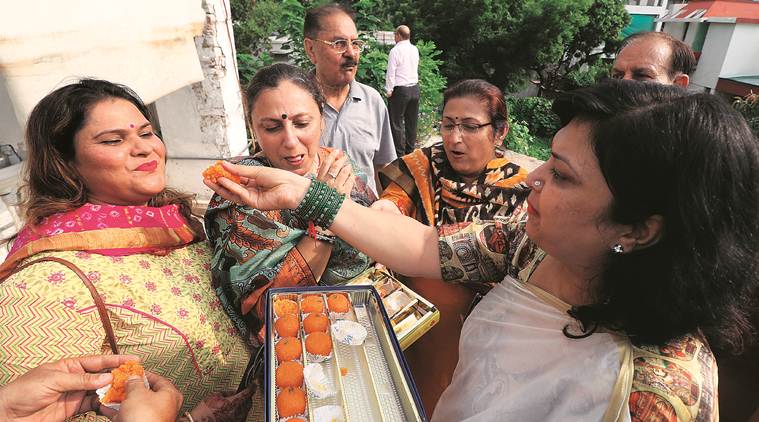Although they welcomed the Narendra Modi government's decision, many leaders of organisations representing migrant Kashmiri Pandits said the move has not opened the road for their return to the Valley.
The Centre’s move to scrap Article 370 of Indian Constitution, which guarantees special status to Jammu and Kashmir, has left many dissatisfied among Kashmiri Pandits and refugees from Pakistan-occupied Kashmir (PoK) – from the Hindu community – in Jammu division of the state.
Although they welcomed the Narendra Modi government’s decision, many leaders of organisations representing migrant Kashmiri Pandits said the move has not opened the road for their return to the Valley – an apparent reference to their demand for a separate homeland there.
Explained | Article 370 has not been scrapped but Kashmir’s special status has gone
Refugees from PoK called it a retrograde move that has converted a full-fledged state into a Union Territory.
Many refugees from Pakistan’s Punjab – or “West Pakistan” – however expressed satisfaction at having been “liberated from 70 years of continuous discrimination”.
“It is an unprecedented and historic decision and should have been done back in 1947. We hope this provision has something for us also,’’ Dr Agnishekhar, chairman of Panun Kashmir, one of the main organisations of displaced Kashmiri Pandits, said, referring to geopolitical aspirations of the displaced community.
“For us, the road for our return to home have not yet opened since our demand for a separate homeland within Kashmir Valley remains,’’ he said. “However, it is the biggest victory for the Indian State, as a Muslim state within a secular India stands demolished today’’.
Vinod Pandit, another Kashmiri Pandit leader, said, “It is welcome (move), but where is my space in it?”
He said the Centre needs to look at social and political rehabilitation of Kashmiri Pandits who are living in exile.
“Scrapping Article 370 and declaring J&K as a Union Territory does not mean I can now return to the Valley, especially when there is increased radicalisation (in Kashmir) and I have no land there,’’ Pandit said. “We welcome the decision, as it is a need of the nation, but at the same time we need a space for ourselves there.”
T K Dhar of Tripura Sundari Sanstha Devsar, Kulgam, said although the decision is aimed at ensuring J&K’s total integration with India, it has nothing for Kashmiri Pandits. It does not open the doors for return of Pandits to the Valley. It would have been better, he said, if Jammu as well as Kashmir Valley were made separate states instead of one UT.
J&K National Panthers Party’s chairman Harsh Dev Singh called the government’s decision “half-hearted and retrograde”, which has not only led to bifurcation of a full-fledged state but also converted it into a Union Territory. “They have retained Part-I of Article 370, which talks of concurrence of State Legislature in respect to making of laws by Indian Parliament in respect to J&K,” he said.
Singh said the government should have scrapped all provisions of Article 370.
The Panthers Party chief said people of Jammu have been the “biggest victim” of the NDA government’s decision, as earlier they were exploited by “Kashmir-centric rulers”, and now, with J&K becoming a UT, they will be under the dominance of Delhi as well, apart from Kashmir. “We have always supported total integration of J&K with the Indian Union, but they (Centre) have taken us backward by converting us into a UT,’’ Singh added.
Rajiv Chuni, chairman of SOS International, an organisation of people displaced from areas of PoK, expressed dissatisfaction over the decision and said the Centre was earlier addressing Kashmiri migrants and now Punjabis (from Pakistan) who were victims of Partition in 1947.
“For the last 70 years, we were exploited by Kashmiri rulers and now when time came for our liberation, they (Centre) have made us slaves of Delhi,’’ Chuni said. “There has been nothing for PoK refugees, who are the first victims of J&K conflict and who had to migrate to the present J&K, leaving behind all their properties in PoK,” Chuni said.
Labha Ram Gandhi, a senior leader of approximately 25,000 refugees from West Pakistan based in different areas of J&K since Partition, said, “We were a people without a state – although we were considered Indian citizens, we were not treated as permanent residents of J&K. We were allowed to vote in Lok Sabha polls, but not in J&K Assembly elections.”
He said, “We are living in J&K for the last four or five generations but our children still cannot get admissions in professional colleges here, or get state government jobs. With Article 370 scrapped, we too have got status of permanent residents of a state, like our counterpart who migrated from West Pakistan in 1947 partition and settled elsewhere in the country.”
Welcoming the Centre’s move, Mansoor Qadir, chairman of Bhaderwah Eco Watch and a social activist, said it will end the “blackmail” of Kashmiri politicians. He said UT status to J&K will also bring an end to corruption, as J&K will remain under constant supervision of the Centre.
Source: Read Full Article


